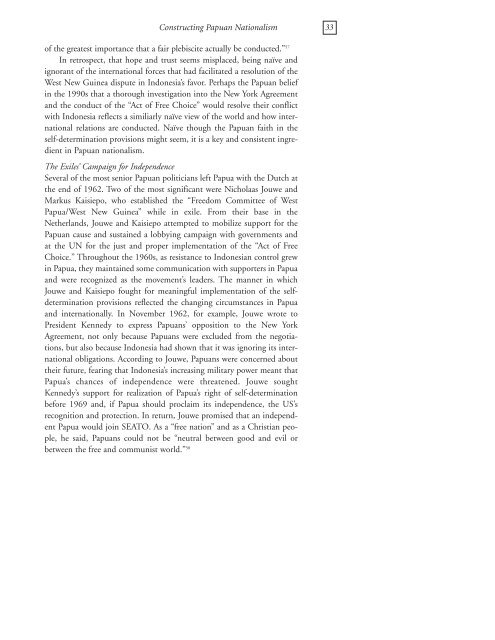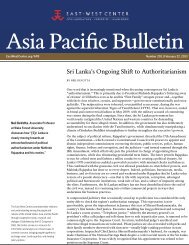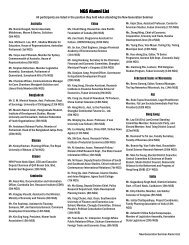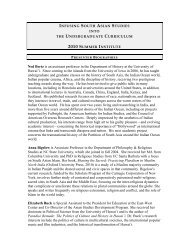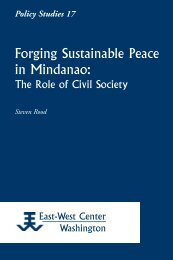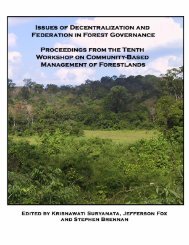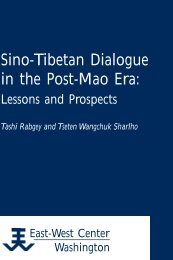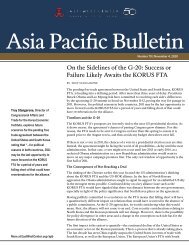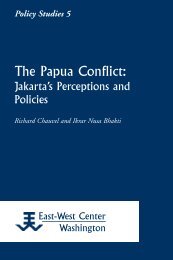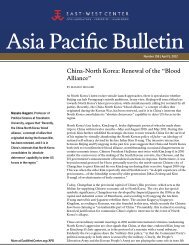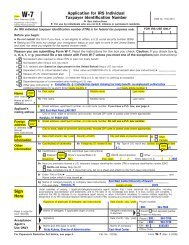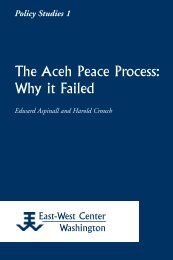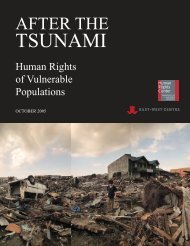Constructing Papuan Nationalism: History, Ethnicity ... - ScholarSpace
Constructing Papuan Nationalism: History, Ethnicity ... - ScholarSpace
Constructing Papuan Nationalism: History, Ethnicity ... - ScholarSpace
- No tags were found...
Create successful ePaper yourself
Turn your PDF publications into a flip-book with our unique Google optimized e-Paper software.
<strong>Constructing</strong> <strong>Papuan</strong> <strong>Nationalism</strong> 33of the greatest importance that a fair plebiscite actually be conducted.” 57In retrospect, that hope and trust seems misplaced, being naïve andignorant of the international forces that had facilitated a resolution of theWest New Guinea dispute in Indonesia’s favor. Perhaps the <strong>Papuan</strong> beliefin the 1990s that a thorough investigation into the New York Agreementand the conduct of the “Act of Free Choice” would resolve their conflictwith Indonesia reflects a similiarly naïve view of the world and how internationalrelations are conducted. Naïve though the <strong>Papuan</strong> faith in theself-determination provisions might seem, it is a key and consistent ingredientin <strong>Papuan</strong> nationalism.The Exiles’ Campaign for IndependenceSeveral of the most senior <strong>Papuan</strong> politicians left Papua with the Dutch atthe end of 1962. Two of the most significant were Nicholaas Jouwe andMarkus Kaisiepo, who established the “Freedom Committee of WestPapua/West New Guinea” while in exile. From their base in theNetherlands, Jouwe and Kaisiepo attempted to mobilize support for the<strong>Papuan</strong> cause and sustained a lobbying campaign with governments andat the UN for the just and proper implementation of the “Act of FreeChoice.” Throughout the 1960s, as resistance to Indonesian control grewin Papua, they maintained some communication with supporters in Papuaand were recognized as the movement’s leaders. The manner in whichJouwe and Kaisiepo fought for meaningful implementation of the selfdeterminationprovisions reflected the changing circumstances in Papuaand internationally. In November 1962, for example, Jouwe wrote toPresident Kennedy to express <strong>Papuan</strong>s’ opposition to the New YorkAgreement, not only because <strong>Papuan</strong>s were excluded from the negotiations,but also because Indonesia had shown that it was ignoring its internationalobligations. According to Jouwe, <strong>Papuan</strong>s were concerned abouttheir future, fearing that Indonesia’s increasing military power meant thatPapua’s chances of independence were threatened. Jouwe soughtKennedy’s support for realization of Papua’s right of self-determinationbefore 1969 and, if Papua should proclaim its independence, the US’srecognition and protection. In return, Jouwe promised that an independentPapua would join SEATO. As a “free nation” and as a Christian people,he said, <strong>Papuan</strong>s could not be “neutral between good and evil orbetween the free and communist world.” 58


